Normally this type of problems is solved using Tries. I will base my implementation of a Trie on How to create a trie in c# (but notice that I have rewritten it).
var trie = new Trie(new[] { "un", "que", "stio", "na", "ble", "qu", "es", "ti", "onable", "o", "nable" });
//var trie = new Trie(new[] { "u", "n", "q", "u", "e", "s", "t", "i", "o", "n", "a", "b", "l", "e", "un", "qu", "es", "ti", "on", "ab", "le", "nq", "ue", "st", "io", "na", "bl", "unq", "ues", "tio", "nab", "nqu", "est", "ion", "abl", "que", "stio", "nab" });
var word = "unquestionable";
var parts = new List<List<string>>();
Split(word, 0, trie, trie.Root, new List<string>(), parts);
//
public static void Split(string word, int index, Trie trie, TrieNode node, List<string> currentParts, List<List<string>> parts)
{
// Found a syllable. We have to split: one way we take that syllable and continue from it (and it's done in this if).
// Another way we ignore this possible syllable and we continue searching for a longer word (done after the if)
if (node.IsTerminal)
{
// Add the syllable to the current list of syllables
currentParts.Add(node.Word);
// "covered" the word with syllables
if (index == word.Length)
{
// Here we make a copy of the parts of the word. This because the currentParts list is a "working" list and is modified every time.
parts.Add(new List<string>(currentParts));
}
else
{
// There are remaining letters in the word. We restart the scan for more syllables, restarting from the root.
Split(word, index, trie, trie.Root, currentParts, parts);
}
// Remove the syllable from the current list of syllables
currentParts.RemoveAt(currentParts.Count - 1);
}
// We have covered all the word with letters. No more work to do in this subiteration
if (index == word.Length)
{
return;
}
// Here we try to find the edge corresponding to the current character
TrieNode nextNode;
if (!node.Edges.TryGetValue(word[index], out nextNode))
{
return;
}
Split(word, index + 1, trie, nextNode, currentParts, parts);
}
public class Trie
{
public readonly TrieNode Root = new TrieNode();
public Trie()
{
}
public Trie(IEnumerable<string> words)
{
this.AddRange(words);
}
public void Add(string word)
{
var currentNode = this.Root;
foreach (char ch in word)
{
TrieNode nextNode;
if (!currentNode.Edges.TryGetValue(ch, out nextNode))
{
nextNode = new TrieNode();
currentNode.Edges[ch] = nextNode;
}
currentNode = nextNode;
}
currentNode.Word = word;
}
public void AddRange(IEnumerable<string> words)
{
foreach (var word in words)
{
this.Add(word);
}
}
}
public class TrieNode
{
public readonly Dictionary<char, TrieNode> Edges = new Dictionary<char, TrieNode>();
public string Word { get; set; }
public bool IsTerminal
{
get
{
return this.Word != null;
}
}
}
word is the string you are interested in, parts will contain the list of lists of possible syllables (it would probably be more correct to make it a List<string[]>, but it's quite easy to do it. Instead of parts.Add(new List<string>(currentParts)); write parts.Add(currentParts.ToArray()); and change all the List<List<string>> to List<string[]>.
I'll add a variant of Enigmativity response thas is theretically faster than his because it discards wrong syllables immediately instead of post-filtering them later. If you like it, you should give him a +1, because without his idea, this variant wouldn't be possible. But note that it's still an hack. The "right" solution is in using Trie(s) :-)
Func<string, bool> isSyllable = t => Regex.IsMatch(t, "^(un|que|stio|na|ble|qu|es|ti|onable|o|nable)$");
Func<string, IEnumerable<string[]>> splitter = null;
splitter =
t =>
(
from n in Enumerable.Range(1, t.Length - 1)
let s = t.Substring(0, n)
where isSyllable(s)
let e = t.Substring(n)
let f = splitter(e)
from g in f
select (new[] { s }).Concat(g).ToArray()
)
.Concat(isSyllable(t) ? new[] { new string[] { t } } : new string[0][]);
var parts = splitter(word).ToList();
An explanation:
from n in Enumerable.Range(1, t.Length - 1)
let s = t.Substring(0, n)
where isSyllable(s)
We calculate all the possible syllables of a word, from length 1 to the length of the word - 1 and check if it's a syllable. We weed out directly the non-syllables. The full word as a syllable will be checked later.
let e = t.Substring(n)
let f = splitter(e)
We search the syllables of the remaining part of the string
from g in f
select (new[] { s }).Concat(g).ToArray()
And we chain the found syllables with the "current" syllable. Note that we are creating many useless arrays. If we accept to have an IEnumerable<IEnumerable<string>> as the result, we can take away this ToArray.
(we could rewrite many rows together, deleting many let, like
from g in splitter(t.Substring(n))
select (new[] { s }).Concat(g).ToArray()
but we won't do it for clarity)
And we concatenate the "current" syllable with the found syllables.
.Concat(isSyllable(t) ? new[] { new string[] { t } } : new string[0][]);
Here we could rebuild the query a little so to not use this Concat and create empty arrays, but it would be a little complex (we could rewrite the entire lambda function as a isSyllable(t) ? new[] { new string[] { t } }.Concat(oldLambdaFunction) : oldLambdaFunction)
In the end, if the whole word is a syllable, we add the whole word as a syllable. Otherwise we Concat an empty array (so no Concat)

